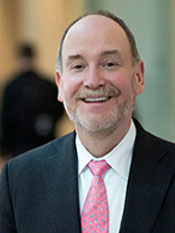Ross Faculty Discuss December Financial Times-Michigan Ross Poll

Announced in October 2023, Michigan Ross and the Financial Times are partnering on a monthly poll to track how American voters perceive financial and economic issues in the lead-up to the 2024 US presidential election. The poll will run for 12 months leading up to the election.
Alongside the announcement of each month’s poll results, Michigan Ross faculty will comment on data they find especially compelling. The faculty contingent includes Marcus Collins, Jerry Davis, Erik Gordon, Tom Lyon, and Sarah Miller. The quintet is collaborating with the Financial Times to develop questions each month; one set will be used every month, while another set will change month to month to measure opinions about timely matters.
FT-Michigan Ross Poll - December 2023
Americans continue to point to high inflation as their biggest concern when it comes to their finances, though the poll found a bit more optimism on economic conditions compared with the results last month. Still, the gloomy outlook continues to weigh on Biden’s re-election prospects, with only 17 percent of Americans believing they are better off financially since he became president, while 53 percent said they were worse off. That was a marginal improvement compared to the previous month, when 14 percent of Americans said they were better off financially with Biden in the White House, and 55 percent said they were worse off.

Erik Gordon
On economic sentiment shaping presidential
approval …
“Americans think economic conditions are lousy.
“Politicians and policymakers at the Federal Reserve, the White House, and on Capitol Hill look at numbers like unemployment rates and the Consumer Price Index, and tell us that conditions aren’t so bad and are getting better. Few of us agree.
“In (December’s) FT - Michigan Ross poll, 76% of people in the nationwide sample say economic conditions are either “not so good” or “poor.” Only 19% say conditions are “good” and just 2% say they are excellent. Although Republicans rate the economy more negatively than Democrats, even Democrats are negative by nearly a two-to-one margin.
"People who live in the South or Midwest are more negative than people in the West or Northeast, and women are slightly more negative than men. Young people are the most negative. In the 18-29 year-old age bracket, there are 11 people who are negative about the economy for every person who is positive."
“It is not surprising that President Biden gets a lot of blame – 61% disapprove of how he is handling the economy versus 36% who do approve (and 3% who aren’t sure). He is rated much better by Democrats than by Republicans, but he nevertheless suffers a 30% disapproval rating among Democrats. In good times, sitting Presidents get credit for things they didn’t do. In bad times, they get blamed for conditions they might not have created.”

Jerry Davis
On perception and reality regarding the U.S. economy…
“American voters express far more pessimism about the economy than we might expect from the data. This has become particularly pronounced since 2020. The University of Michigan’s Index of Consumer Sentiment – the gold standard for measuring how Americans feel about the economy – normally closely tracks economic fundamentals (inflation, unemployment, stock market returns, consumption). But since 2020 that model has broken down, and the American public – particularly the Republican part -- seems much more negative about the economy than is warranted by objective facts.
Perhaps the problem is that voters are not seeing the same data. We normally imagine that we all can agree on basic facts -- things that can be easily verified in under a minute on your smartphone. But what if there is disagreement not just on interpretations of facts, but what the facts are?
“To examine this idea, the FT - Michigan Ross poll asked voters a few factual questions about the economy. The results showed that Trump voters are especially prone to being wrong about just how bad things are. The unemployment rate was 6.3% in January 2021 and is currently at 3.9% (a historic low). Yet 31% of Trump voters believe unemployment has gone up, and 32% believe it has stayed about the same (compared to 12% and 24% of Biden voters). 77% of Trump voters believe inflation is getting worse recently, compared to 39% of Biden voters. Yet inflation has dropped substantially over the past 18 months. And the S&P500 has increased 19.6% since Biden took office. Yet 46% of Trump voters believed the stock market has actually declined, compared to 19% of Biden voters.
“When partisanship affects not just interpretations of the facts but beliefs about the facts themselves, polarization will not be easy to overcome.”

Sarah Miller
On bipartisan support to assist Medicaid eligible beneficiaries …
“As the COVID-19 public health emergency provisions wind down, state Medicaid offices are in the process of verifying the eligibility of their enrollees. While in principle a worthy goal, the process has been bumpy, with many eligible beneficiaries removed from their health insurance plan due to missing or incomplete paperwork. According to the Department of Health and Human Services, almost seven million of the 15 million people who will lose health insurance coverage will actually still be eligible for the program. At a time when most policy topics are highly polarizing, it was interesting to see that in the December FT - Michigan Ross poll, most voters wanted the government to take action to stop this process, and Democrats, Republicans, and independents alike expressed a net approval for slowing this unwinding.”







